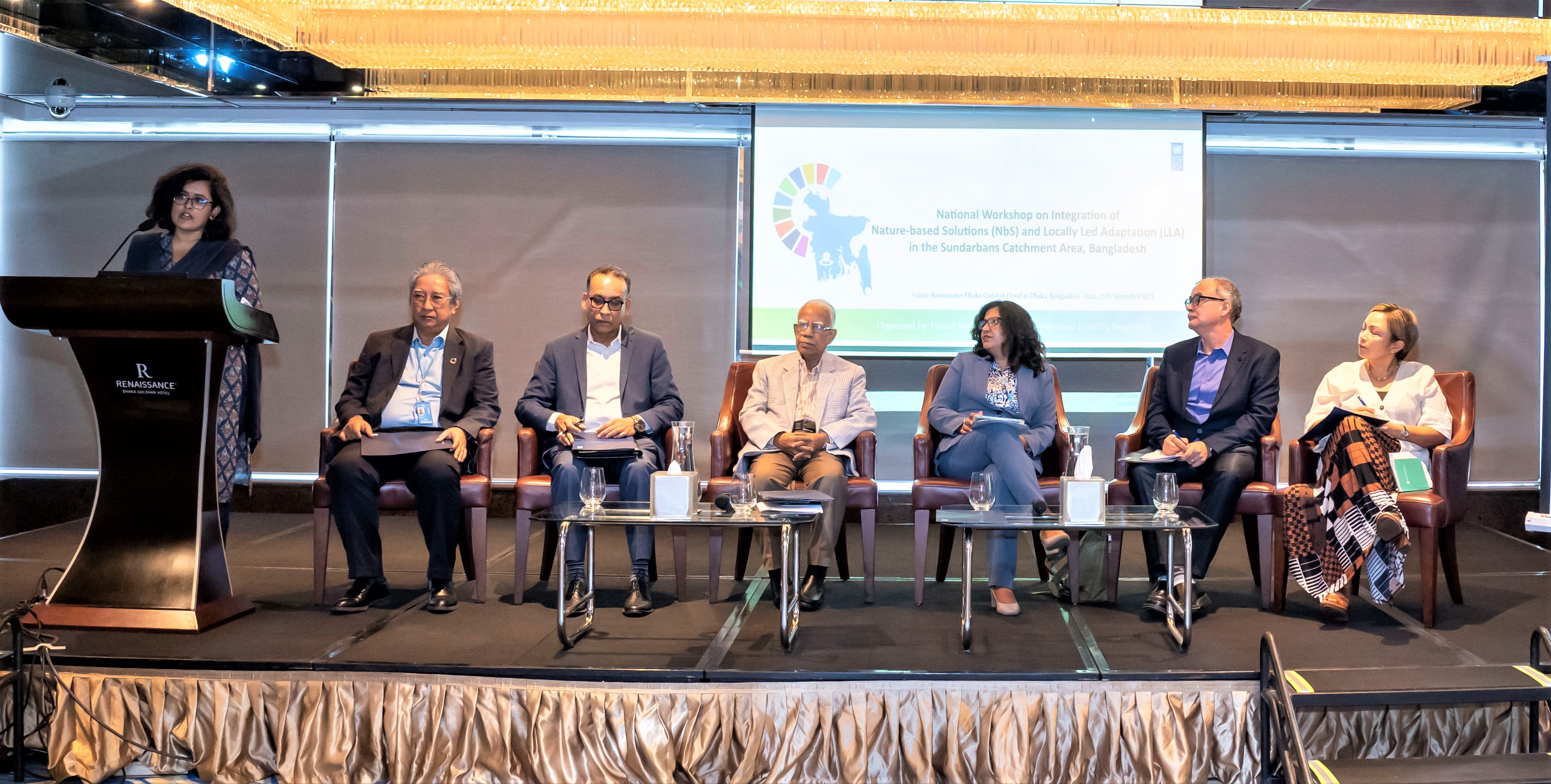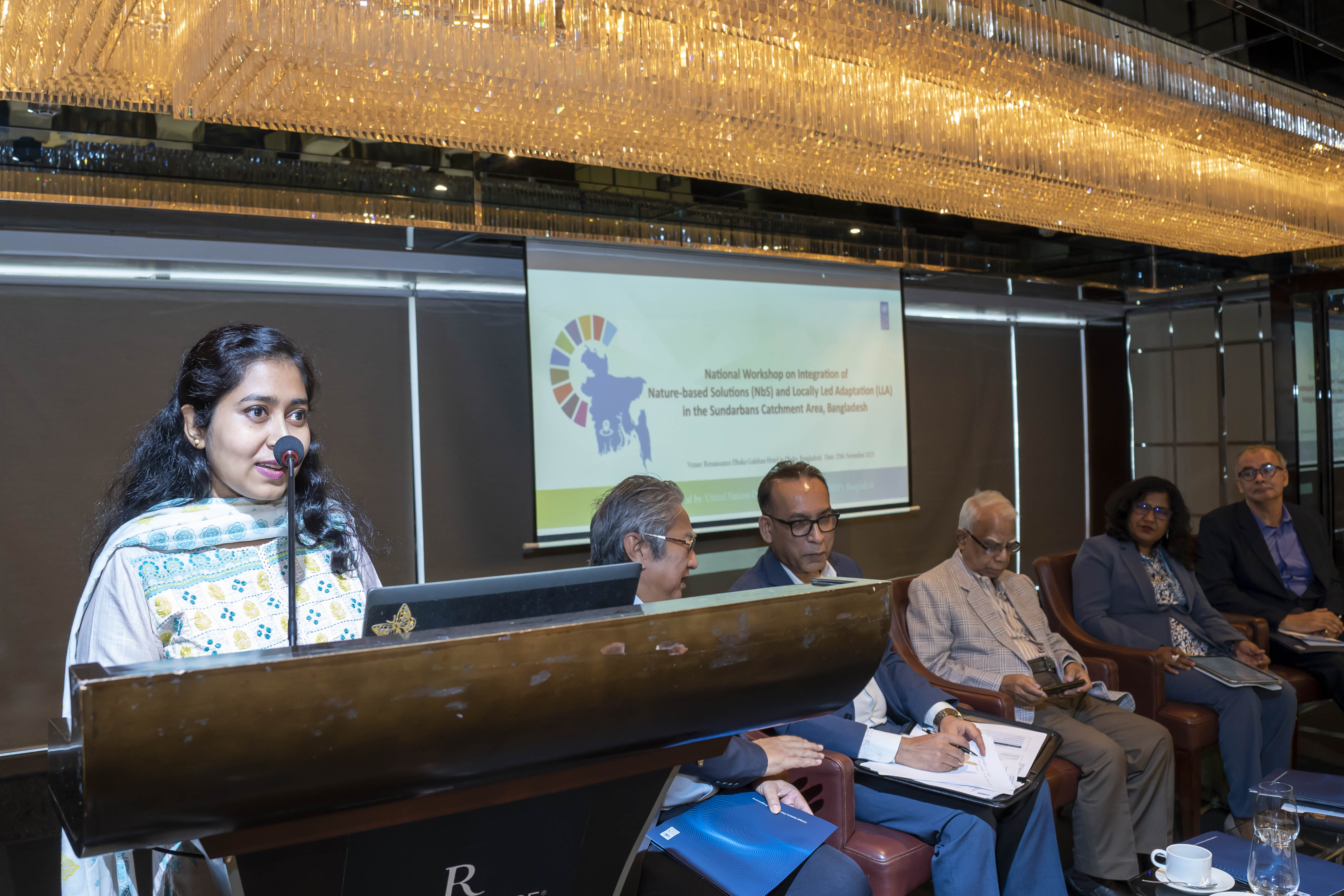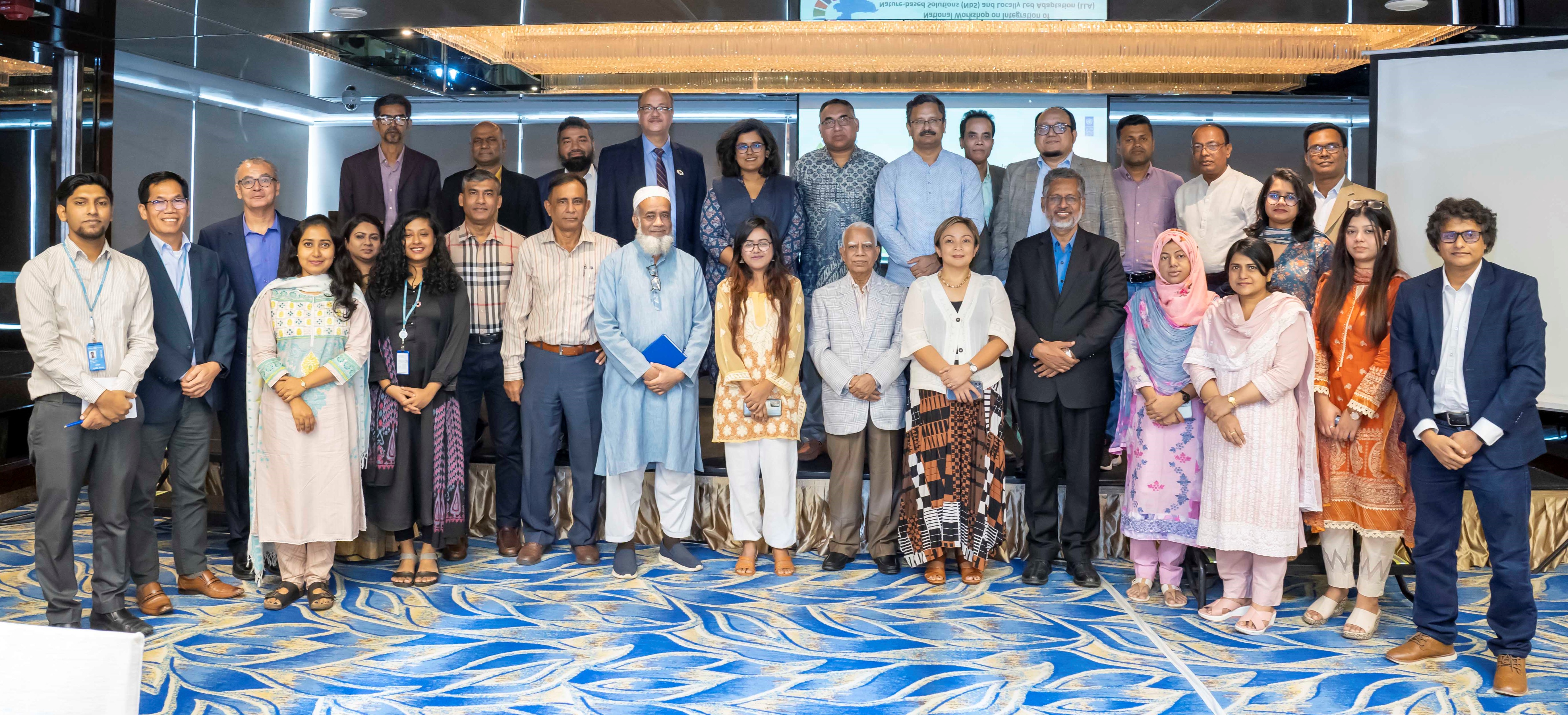Preserving the Sundarbans: A Path to Resilience Through Nature-Based Solutions and Local Leadership
An Integrated Approach: Area-based programming in Sundarbans Catchment Area through Nature-based Solutions and Locally-led Adaptation
December 19, 2023
The United Nations Development Programme (UNDP) recently hosted a crucial National Workshop in Dhaka, Bangladesh, with a focus on incorporating Nature-Based Solutions (NbS) and Locally Led Adaptation (LLA) strategies into the management of the world's largest mangrove forest, situated in Bangladesh. Conducted at the Renaissance Hotel on November 25, 2023, the workshop's objective was to engage with various stakeholders to pinpoint critical issues, determine priority areas for intervention, and gain insights into the challenges and opportunities associated with integrating LLA and NbS. This initiative aimed to address the urgent developmental needs of the region.

Panelists and key stakeholders gathered at the national consultation workshop on “Integration of Nature-based Solutions (NbS) and Locally-led Adaptation (LLA) in the Sundarbans Catchment Area, Bangladesh” to engage and share their views.
The Sundarbans, a UNESCO World Heritage Site, spans over 6,000 square kilometers and is a critical bastion of biodiversity. It is a natural shield against climatic calamities, safeguarding millions from cyclones and tidal surges. However, this ecological marvel faces threats from climate change, including rising sea levels and increasing temperatures, which disrupt its ecological equilibrium and threaten local livelihoods. Recognizing the urgency, UNDP's workshop brought together government officials, academicians, NGOs, CSOs, INGOs, and representatives from UN agencies to discuss sustainable solutions for this region.
The workshop served as a vibrant platform for dialogue and idea exchange, featuring prominent figures such as Iqbal Abdullah Harun, Additional Secretary, Ministry of Environment, Forest and Climate Change, who graced the event as the Chief Guest. Other eminent personalities included Dr. Mohammed Asaduzzaman, Former Research Director and Professorial Fellow, BIDS; Dr. Stefan Alfred Groenewold, Principal Advisor, GIZ; Nayoka Martinez-Bäckström, First Secretary and deputy Head of Development Cooperation, Embassy of Sweden in Dhaka, Bangladesh; and Sonali Dayaratne, Deputy Resident Representative, UNDP.
The opening session, led by UNDP specialists like Prasenjit Chakma, Assistant Resident Representative; Dr. Maliha Muzammil, Programme Specialist - Climate Change, and Farzana Rahman, Programme Officer, UNDP Bangladesh, highlighted the organization's commitment to systems-level thinking and integrated programming. They shared insights from UNDP's experiences in area-focused programming, particularly in building community resilience against climate change.

Dr. Haseeb Md. Irfanullah, National Consultant - Climate Change and Biodiversity, UNDP Bangladesh, underscored the integration of NbS and LLA in addressing governance challenges and community inclusion. The workshop revisited discussions from a regional workshop in Khulna, emphasizing the urgency of stakeholder engagement to protect this vital ecosystem.
Dr. Mohammed Asaduzzaman advocated for tailored, local approaches and urged a reevaluation of past projects to enhance future strategies. Dr. Stefan Alfred Groenewold discussed the complexities and long-term commitments required for effective NbS, emphasizing the need for extensive scientific research to guide these initiatives. Ms. Nayoka Martinez Bäckström stressed the importance of integrated planning and coordinated resource allocation, highlighting the necessity of aligning financial resources with local mandates. Ms. Sonali Dayaratne underlined the significance of integrated, systemic approaches and continuous collaboration across sectors, reflecting UNDP's commitment to systems design-based methodologies.
Iqbal Abdullah Harun, Additional Secretary of the Ministry of Environment, Forest and Climate Change, emphasized the complex and unpredictable nature of environmental challenges in Bangladesh. He highlighted the country's unique vulnerabilities across diverse topographical regions and advocated for nuanced, localized, and participatory environmental solutions. He stressed the need for balancing biodiversity protection with community livelihoods and underscored the government's initiatives, including funding for small-scale environmental projects and developing an ecosystem valuation framework

Guests underscored the importance of area-based programming and integrated approach for maximizing the benefits if Nature based Solutions and Locally-led Adaptation for building climate change resilience of the Sundarbans Catchment Area, Bangladesh
Participants actively engaged in dynamic discussions during the workshop, centering on tangible processes and data exploration. Emphasizing the need to develop local expertise and increase awareness of NbS, the discussions highlighted the critical role of these practices. The attendees underscored the necessity of collaborative efforts among government agencies and the value of shared learning experiences among diverse participants. The focus was on the effective use of data and knowledge to gauge the impact of NbS, particularly in understanding their benefits. Involving communities reliant on the Sundarbans' resources, the group advocated for enhancing local capabilities, promoting NbS practices, and elevating awareness at the grassroots level. The conversation also highlighted the need to align with global and regional objectives for better resource allocation and decision-making. Implementing NbS was advised to be gradual, purposeful, and adaptable. Furthermore, enhancing cooperation between various government departments and facilitating mutual learning among stakeholders were key factors for success.
The workshop underscored UNDP's renewed commitment to enhancing the resilience of the Sundarbans and its surrounding regions—an important haven for diverse wildlife, a natural shield against severe weather events, and a critical source of sustenance and income for millions who rely on it. The atmosphere was charged with enthusiasm and cooperative energy as attendees exchanged insights, shared their enthusiasm, and envisioned targeted programs to foster sustainable development in the area. This joint effort will fortify partnerships to secure a sustainable future for the Sundarbans and their communities. The insights gained from this workshop will be instrumental in promoting and sculpting initiatives and approaches vital for the health and preservation of this ecologically crucial area.

Participants took part in group work to identify aspects/benefits and challenges/concerns of NbS-LLA integration and explored the prospect of area-based programme like SABP in Sundarbans Catchment Area to investigate pragmatic solutions.
Looking forward, the impetus from this workshop is critical. UNDP calls on all parties involved—government agencies, development allies, international and local NGOs, civic groups, academic institutions, and individuals—to be actively involved in safeguarding this unique ecosystem. Your participation is vital in formulating policies, enacting sustainable methods, and guaranteeing the survival of this essential mangrove forest. We must come together, adopting eco-friendly solutions and community-driven adjustments for a lasting and robust future. Engage in neighborhood projects, keep abreast of regional progress, and champion the preservation and sustainable growth of the Sundarbans. Your involvement can significantly impact this key ecosystem's preservation, flourishing future, and reliant communities. Let's collaborate for a thriving and prosperous Sundarbans.
The National Workshop organized by the UNDP in Dhaka marked a significant step toward integrating Nature-Based Solutions (NbS) and Locally Led Adaptation (LLA) in Bangladesh's prominent mangrove forest. This event followed a subnational workshop in Khulna on 11th October 2023, which involved key local stakeholders from CSOs, NGOs, INGOs, Government of Bangladesh officials, and researchers from various organizations. The Dhaka workshop brought together a diverse group of stakeholders, fostering discussions on environmental and community resilience. Through collaborative efforts and a shared vision, the workshop laid the groundwork for ongoing and future initiatives aimed at preserving and enhancing this crucial ecosystem. The commitment to building resilience and sustainable development in the region was clearly evident, paving the way for impactful and long-lasting change.

The engagement and participation at the event was vibrant through the eminent presence of various stakeholders from UN Agencies, Development Partners, CSO, INGOs, NGOs, academia, research organizations and think tanks

 Locations
Locations



